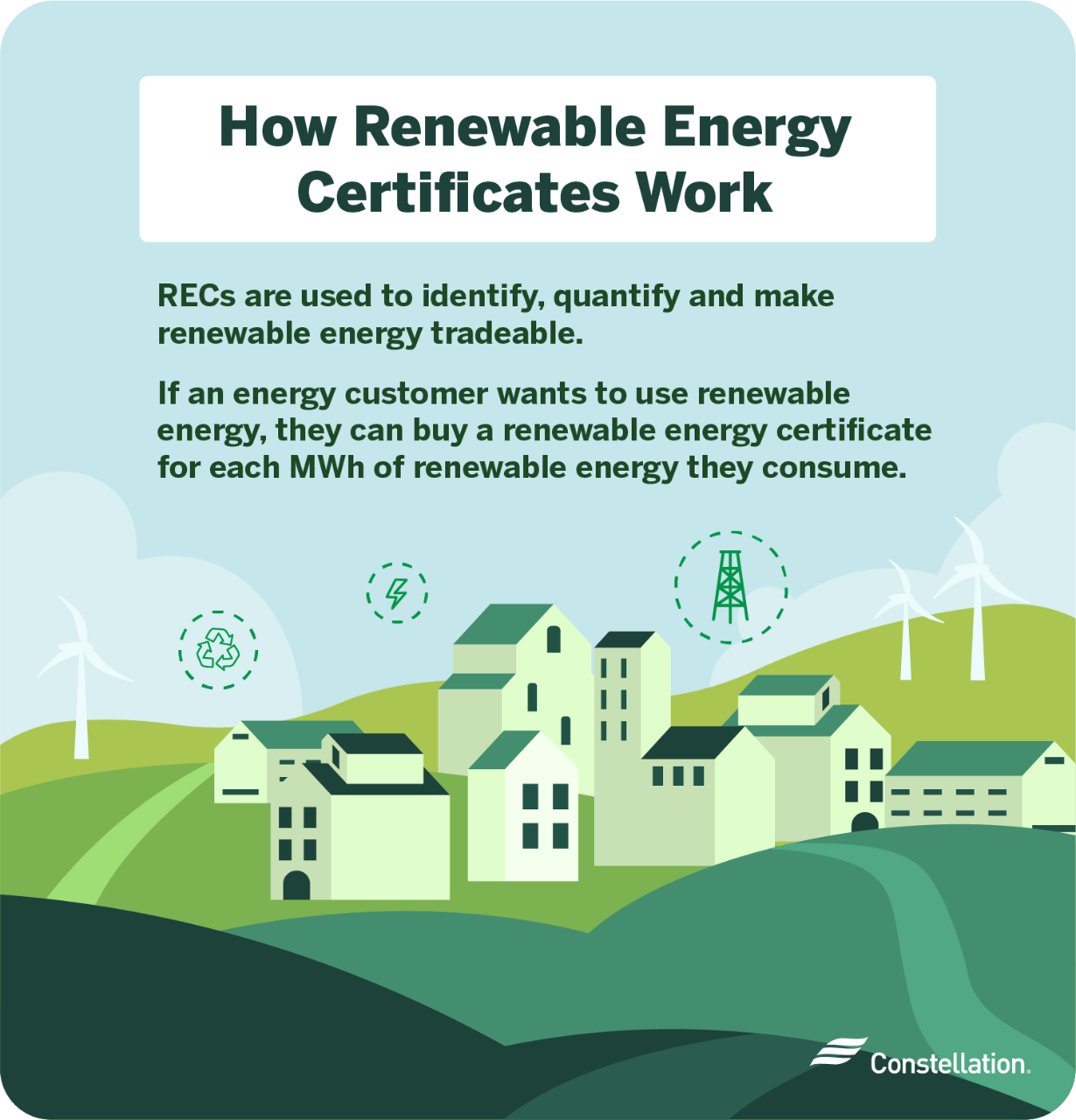Renewable Energy Certificates (RECs) Explained
- Home Page
- Energy 101: Resources to Help Understand Energy
- Energy Innovation
- Renewable Energy Certificates (RECS) Explained
Caring for our environment and reducing carbon emissions, while meeting the energy needs of individuals and businesses, requires commitment in the form of investment and innovation. That is where renewable energy certificates come in.
Renewable energy certificates, also called RECs, are a way to account for–and encourage–renewable energy production and use. They help drive demand, which drives investment and innovation.
Here are the details of RECS, with renewable energy certificates explained.
What are Renewable Energy Certificates (RECs)?
You may have heard about them and may be wondering, what is a renewable energy certificate?
A REC is a way to document, authenticate and track that energy flowing into the power grid comes from a clean, renewable power source. A REC represents the environmental benefits of a single megawatt hour (MWh) of renewable energy that can be paired with electricity. A REC is issued by a power company when a MWh of renewable energy is generated and added to the electricity grid. Electricity generated in a coal-powered plant is indistinguishable from electricity generated by a solar panel once it is flowing in the power grid. RECs address that problem by making renewable energy attributes distinct, quantifiable, and trackable from the point of generation to the customer.
If an energy customer wants to use renewable energy, they can buy a renewable energy certificate to match each MWh of energy they consume. It is a way to separate the renewable energy they want to buy from energy generated by fossil fuels.
How Do Renewable Energy Certificates Work?

Demand for green, clean energy is growing. While power companies are investing heavily in alternative energy sources, power from those sources necessarily flows into the power grid and becomes indistinguishable from fossil-fuel-generated power. It’s not possible nor practical to have a separate regular power grid and renewable power grid.
Yet, the demand for renewable power is there. Some government agencies are mandated to ensure a certain percentage of the power they use comes from clean sources. Companies want to be able to verify that they are limiting their use of energy that contributes to greenhouse gas emissions. Even individuals want to do their part and are willing to make the extra effort to buy and use renewable energy. To sell renewable energy to customers who want to buy it, RECs were created.
A REC is a way to identify, quantify, and make renewable energy tradeable. Who issues renewable energy certificates is a bit complicated. No one organization or group controls them.
Energy suppliers issue RECs as “instruments of recognition.” They create a REC as a record of the production of a MWh of renewable energy. Each certificate includes data as to the type of fuel used, facility, generation date, and more, along with a tracking ID. In addition to power companies creating their own RECs, small energy producers, such as a privately run wind farm, can sell energy into the grid and receive a REC from the utility company for every MWh purchased.
Various state and regional entities track and verify RECs. The Center for Resource Solutions operates something called the Green-e® Energy program that is one of the best known and most trusted systems for auditing, certifying, tracking, and retiring RECs.
Like any financial instrument, RECs can be bought and sold. If an energy customer wants to use renewable energy, they buy a REC for each MWh of renewable energy they consume. Large corporate customers can buy multiple RECs. For smaller businesses or individual customers, it is possible to buy a fraction of a REC.
When the energy that the REC represents is consumed, the REC is “retired” from circulation. That means that environmental attributes that the REC represents have been used. The entity, be it an individual or company, for which the REC is retired, meaning it has used that unit of renewable energy, is the entity that can claim the environmental benefits.
Why Renewable Energy Certificates (RECs) are Important
RECs give producers and customers certified proof that verified renewable energy was generated by a specific source and used by a specific purchaser. Such a system provides many benefits:
- Makes it possible for customers who want to buy renewable energy and support renewable energy producers to differentiate and buy power from these sources.
- Supports the renewable energy market and helps reduce the customer’s carbon footprint and the emission of greenhouse gases.
- Enables generators, users, and stakeholders to know exactly from where electricity is coming and how it was generated.
- Provides documented proof to customers that they are using power from renewable energy producers.
- Gives customers the flexibility to use varying amounts of renewable energy in various locations without having to invest in facilities and equipment to generate it themselves.
- Enables customers who cannot generate their own renewable energy to buy renewable power directly from the grid.
- Empowers small producers of renewable energy to sell energy back to the grid and get a premium price with RECs.
- Creates a way for customers to express their demand and preference for renewable energy and thus encourage increased investment and production in clean power technologies.
Constellation and Renewable Energy Certificates
At Constellation, we are committed to serving you and caring for the environment.
Among the options we provide are wind and solar sourced RECs. Homeowners and small businesses can take advantage of Constellation’s renewable energy options.
Large commercial customers can purchase Green-e® Energy certified RECs from Constellation that are certified and tracked by the nonprofit Center for Resource Solutions.